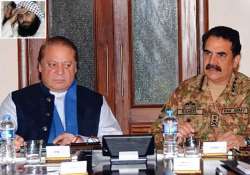Does Masood Azhar's reported detention reflect Pakistan's resolve to tackle cross-border terror?
New Delhi: While neither India nor Pakistan have officially confirmed the detention of Jaish-e-Mohammad Chief Maulana Masood Azhar, the media reports emanating from our western neighbour suggests that the Nawaz Sharif government has taken JeM

New Delhi: While neither India nor Pakistan have officially confirmed the detention of Jaish-e-Mohammad Chief Maulana Masood Azhar, the media reports emanating from our western neighbour suggests that the Nawaz Sharif government has taken JeM chief into ‘protective custody' in connection to Pathankot attack. A minister of Pakistan's Punjab province has also said the same thing on a local TV debate.
The refusal of Pakistan government to confirm the detention is understandable because they don't want to send out a message to their internal audience that they are taking action under duress.
It seems that that Pakistan, for the first time, is acting quickly against a militant group that is accused of launching terror attacks in India. Does it signal a change in Pakistan's approach towards cross-border terror?
Honestly speaking, It's too early to come to any such conclusion because we can't overlook what they did in the past especially when Mumbai attacks took place or Indian Parliament was attacked. First they refused to accept involvement of any Pakistan based group in these attacks and when confronted by India with concrete evidence, they agreed to arrest the culprits under international pressure. They deliberately made weak charge sheet against these terrorists and a pliable judiciary became a willing partner in absolving these militants.
Read Also: Why talking to Nawaz Sharif is dangerous if Pak Army is not fully on board
Since the Pakistan Army had provided patronage to all such terror groups, who they so cleverly call non-state actors, almost every accused, named in these cases, is today roaming free in Pakistan. And the two big names are - Hafiz Saeed and Zaki-ur-Rehman Lakhavi.
There is no denying the fact that Nawaz Sharif has always tried to normalise relations with India but he was always vetoed by Pakistan Army. Prime Minister Narendra Modi's surprise visit to Pakistan to wish Nawaz Sharif on his birthday seems to have infuriated both the terror groups operating from Pakistan and a powerful section of Pakistan Army.
To pour cold water over the goodwill generated by Modi's Lahore visit, JeM launched attack on Pathankot airbase in India. Pakistan Army's complicity is underlined by the media reports that suggest that these terrorists were given training at a Pakistani airbase. Obviously, it would not be possible in absence of at least a section of Pakistan's Armed forces extending tacit support to these terrorists.
So how do we expect Pakistani Army to take against those who are their own creation and who they keep referring to as ‘strategic assets'? They have always differentiated between ‘good terrorists' and ‘bad terrorists'. They take action against those who threaten Pakistan but turn a blind eye to those who target countries like India, Afghanistan and even USA. In fact, Pakistan Army extends tacit support to such ‘strategic assets'.
Does it not astonish that JeM is functioning freely in Pakistan despite the fact that the government has actually banned it? How can a banned outfit continue to operate cocking a snook at the law enforcement agencies? Does it not expose the double-speak of both the civilian government and military establishment in Pakistan?
Having said all this, it also can't be denied that we can't afford to become prisoners of history. If Pakistan has decided that it will also bring their ‘strategic assets' under the net of anti-terror operations and will not spare those who are indulging in cross-border terrorism – from India to Afghanistan – then it will bring a paradigm shift as far as peace and security in this region is concerned.
But the question is – how can we trust the sincerity and resolve of a government that lacks the guts to officially confirm the detention of a dreaded terrorists like Maulana Masood Azhar?
Even if they arrest him under pressure from international community especially Americans who want them to save peace talks with India, will they go whole- hog in making a water-tight case against him that could stand scrutiny in a court of law?